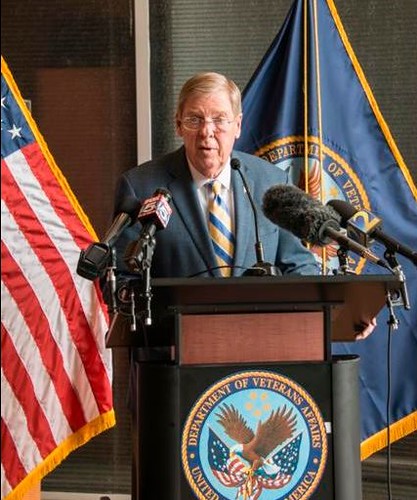
Senator Johnny Isakson is the Chair of the Senate Veterans Affairs Committee. His office issued the following on Thursday:
FOR IMMEDIATE RELEASE
Thursday, June 15, 2017
Contact: Amanda Maddox, 202-224-7777
Kristen Hines, 202-224-9126
Isakson Highlights Choice, Appeals Reforms as Critical VA Priorities
Calls on VA secretary to use resources in fiscal year 2018 budget to improve community care, address appeals backlog
WASHINGTON – U.S. Senator Johnny Isakson, R-Ga., chairman of the Senate Committee on Veterans’ Affairs, called on the Department of Veterans Affairs (VA) to focus its upcoming fiscal year 2018 budget on enhancing the Choice Program and addressing the backlog of appeals.
The president’s fiscal year 2018 VA budget proposal provides $186 billion in funding for the VA’s health, benefits, construction and other administrative programs. A total of $7.3 billion of total VA spending will go to Georgia in 2018 for compensation and pension and readjustment benefits, medical and construction programs and insurance and indemnity programs.
At a committee hearing held Wednesday to examine the president’s fiscal year 2018 VA budget proposal, Isakson noted the importance of using the VA’s resources to deliver timely care to veterans through the Veterans Choice Program and to improve the VA appeals process.
VA Secretary David Shulkin raised new concerns with the committee at Wednesday’s hearing that the existing funds for the Veterans Choice Program have been expended more quickly than expected and the program is set to run out of funds by mid-August. Isakson stated that this latest revelation was frustrating, but doubled down on his commitment to finding the funds to keep the program intact as he and his colleagues continue their work on a legislative compromise to secure the future of the program.
“We get bogged down sometimes in legi-speak, words like mandatory and discretionary, this acronym and that acronym, when it’s all the same money in the instance you’re talking about: It’s for veterans’ health care benefits. We’re not raising expenditures of the taxpayers, we’re just trying to meet our only obligation to our veterans,” Isakson said.“We need to find a way to do that, not just on a stopgap measure but permanent.”
Last week, on June 7, the committee held a hearing to discuss the future of the Veterans Choice Program with Secretary Shulkin. Isakson is currently working with his colleagues in the House and Senate as well as with various stakeholders, including VA Secretary Shulkin, on legislation to enhance the Veterans Choice Program to ensure care in the community is available to veterans.
Isakson also questioned Secretary Shulkin about the appeals process and how the VA plans to handle the pending backlog of appeals of veterans’ claims. The VA’s current appeals process is in desperate need of updating, and nearly half a million veterans who have filed appeals are in limbo because of the VA’s existing backlog. Between fiscal year 2015 and fiscal year 2017, the number of pending appeals increased from approximately 380,000 to 470,000 – a more than 20 percent increase.
“I have consistently said that any decision to improve the appeals process must consistently deal with the 470,000 veterans whose claims are pending today at the VA,”asked Isakson. “If both appeals reform and the budget request are adopted, would the VA be able to make accelerated decisions for those 470,000 appeals that remain pending?”
Secretary Shulkin said that the VA is focused on modernizing the appeals process and will continue to work through the existing appeals, often referred to as “legacy” appeals, that are under review by the Board of Veterans’ Appeals and the Veterans Benefits Administration, but revealed that it would take an additional $800 million to address the existing backlog.
“We've got to make the hard decisions,” Isakson responded. “One of them is going to be addressing legacy claims and not let them build up in the future.”
Isakson continued, “When an American citizen signs up for the United States military and commits themselves to a period of service, carries out that service, and then meets the qualifications necessary for them to prequalify for VA health care in their retirement or when they leave the service, then we are obligated as a nation to pay for those benefits.”
Isakson also commended Secretary Shulkin on his decision to adopt the same Electronic Health Record (EHR) system as the Department of Defense for veterans’ medical records.
“It was silly to have two different agencies in the same government, serving the same soldiers fighting for the same country and same Constitution, that were using two medical records systems that were not interoperable one to the other,” said Isakson. “I think this move will prove to be a tremendous move economically for the VA and wise for our veterans.”
###
The Senate Committee on Veterans’ Affairs is chaired by U.S. Senator Johnny Isakson, R-Ga., in the 115th Congress. Isakson is a veteran himself – having served in the Georgia Air National Guard from 1966-1972 – and has been a member of the Senate Committee on Veterans’ Affairs since he joined the Senate in 2005. Isakson’s home state of Georgia is home to more than a dozen military installations representing each branch of the military as well as more than 750,000 veterans.